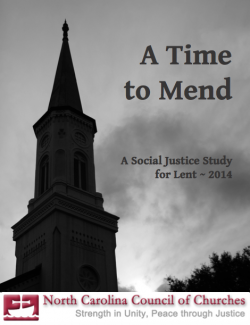 In recognition of our faithful call and of this time in history, the Council’s annual Lenten guide focuses on poverty and the ways we can respond to our sisters and brothers of low-income. We hope you and your family will find cause for reflection and inspiration for action as you share this intergenerational resource together. May we continue building as a nation toward a place where God’s love is felt by everyone through the meeting of basic human needs and the extension of true opportunities for progress.
In recognition of our faithful call and of this time in history, the Council’s annual Lenten guide focuses on poverty and the ways we can respond to our sisters and brothers of low-income. We hope you and your family will find cause for reflection and inspiration for action as you share this intergenerational resource together. May we continue building as a nation toward a place where God’s love is felt by everyone through the meeting of basic human needs and the extension of true opportunities for progress.
Click here to download “A Time to Mend: A Social Justice Study for Lent.”
Scripture: Luke 9:57-58 (NRSV)
Foxes have holes, and birds of the air have nests; but the Son of Man has nowhere to lay his head.
Social Justice Reflection
Where did you sleep last night? Were you warm? Did you worry about your safety? Did you have access to a bathroom? Did you have hot water? Did your roof leak?
Shelter is one of our most basic needs. After a warm shower, most of us slept soundly in a comfortable bed with blankets piled on. We had electricity to run the heat. We were not worried about leaks in the roof, cracks in walls that allow in rats or mice or cold. The kind of home that you have impacts social and economic success. Where you live determines where your children go to school. It determines your sense of safety, and how far you must go for services or employment. Your personal health is impacted by where you live. But these issues are only a few of the challenges faced by someone who is homeless or who lives in substandard housing.
Jesus himself experienced homelessness! Even at his birth, “there was no room in the inn.” When we see homelessness and open our heats to caring, it is as if we are helping Jesus himself. Do you see the homeless all around you?
In North Carolina, more than 10,000 households go without heat in the winter; and more than 16,000 homes still lack indoor plumbing. For those who lack even inadequate housing, at least twenty North Carolina counties have no homeless shelters, and the shelters we have are filled to capacity.
Nationally, about 25% of homeless people are employed and about 40% of homeless men are veterans. But did you know that the average age of a homeless person in America is nine and that 40% of the homeless are children? One of the fastest growing segments of the homeless population is families with children. Homelessness is harmful to children. They get sick more often. They have more problems in school. Their families may be split up. They may even find themselves on their own. Tonight, more than one million children will be homeless in America.
Many situations can lead to being homeless. Not enough homes that people can afford, natural disasters, job loss, mental illness, death of a family member, addiction, domestic violence and medical emergencies. These are not unusual life crises. Everyone experiences these types of challenges in their lives, but not everyone becomes homeless.
The difference between people who experience them and don’t lose their housing and those who become homeless is support. The homeless have one thing in common. They have a profound lack of support. They are often without the relationships that help many of us through life’s setbacks.
May our response to homelessness be grounded in that support and in providing those relationships so that all might have a place to lay their heads.
Closing Prayer
Lord, open our eyes that we may see. We pray for peace, and justice, mercy, and forgiveness. We pray for an end to homelessness. We pray for those who yearn for a simple, decent and affordable place to call home. Help us to respond to the needs of the homeless as if we were responding to you. Give us the courage to make a difference. Amen.
Links
- www.nchousing.org
- www.habitat.org
- www.endhomelessness.org
- www.nationalhomeless.org
- www.homewardboundwnc.org
Intergenerational Questions
Ask your children to explain what home is. What do you need to have to have a home? Ask if they know anyone who is homeless or lives in a house that is not healthy or safe.
Read the book “Fly Away Home” by Eve Bunting or watch the video “Fly Away Home” by Reading Rainbow. Discuss situations that might cause a family to become homeless.
Ask your children what they would take with them if they had to leave home and had only 10 minutes to pack. Have them write down the things they would take. Discuss their choices and point out they will be without the things they left behind. Where would they get those things they need but no longer have? (basics like toiletries, warm clothes, etc.)
Read the scripture and explain what Jesus is asking us to do. Decide as a family to do one of the suggested activities.
Intergenerational Activities
- Spend a day eating in survival mode. (No cooking facilities. No running water)
- On a designated day, whenever you need a drink of water or need water for cooking, go to the faucet outdoors. Drink only water, no soda or juice for that day.
- Don’t look away from homeless people as if they do not exist. Make eye contact, say a few words. This reaffirms their humanity. Try to respond with caring.
- Become aware of your language. Try to minimize language in your own and others vocabularies that refers to people experiencing homelessness in derogatory ways. Remember they are people first. Be a model for others.
- Donate to local shelters or housing programs: clothes, household goods, books, survival kits (band aids, comb or brush, trial-size toiletries, toothbrush, toothpaste), toys, diapers, quarters for the Laundromat, baby wipes, formula, and school supplies.
- Donate hats, mittens, and coats.
- Prepare bedtime snacks in zip-lock bags and donate them to a shelter.
- Volunteer at a shelter or soup kitchen as often as you can. Include the whole family. This will give a real face to homelessness.
- Help build or fix up houses or shelters.
- Buy a bus pass and donate it.
- Donate to a tutoring program or summer camp scholarship program.

